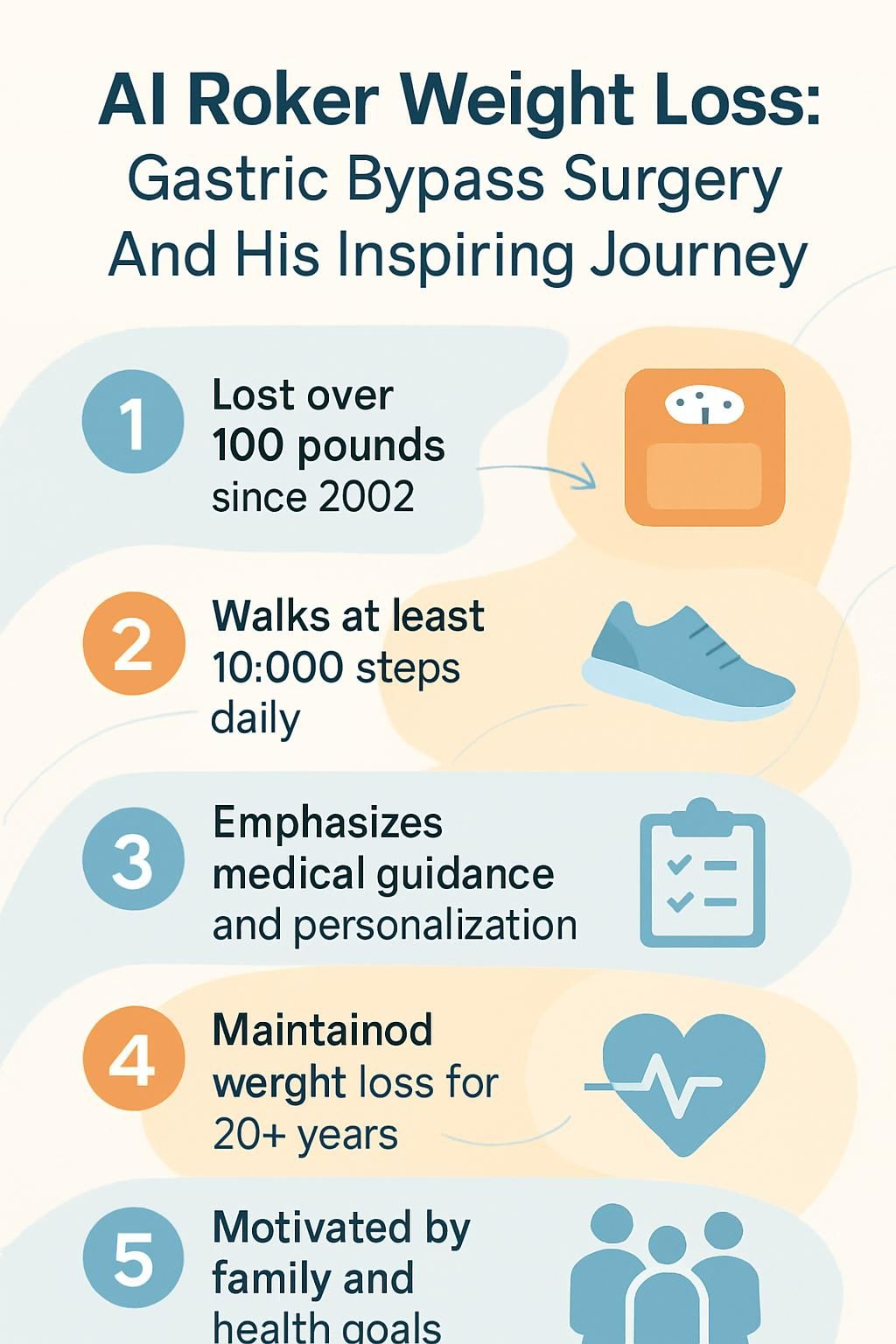Al Roker Weight Loss: Gastric Bypass Surgery And His Inspiring Journey
Our Nutrition Assistant AI Suite will transform your body. You will lose fat, get toned, and build muscle. Gain confidence and optimal health.
If you have tried to lose weight and keep gaining it back, you are not alone. The Al Roker weight loss story shows how a well-known weatherman faced the same cycle, then changed course with gastric bypass surgery in 2002. His experience offers practical steps you can use right away.
In this article, you will see the obstacles he faced and the habits that helped him maintain his 100-pound weight loss for more than two decades. You will also find simple strategies to start your own health journey, even if you have had many restarts.
Keep reading for clear tips you can put into practice today.
Key Takeaways
- Al Roker lost over 100 pounds after gastric bypass surgery in 2002 and has maintained that loss for more than 20 years.
- He uses a low-carb, high-protein diet, daily weigh-ins, portion control, and regular activity, including a goal of 10,000 steps per day.
- Support from family, and the desire to stay healthy for his children and granddaughter Sky, helped him stay focused during setbacks.
- He urges people to work with medical professionals and supports personalized plans, which can include weight loss drugs like Ozempic when appropriate.
- His journey shows that discipline, consistency, and a strong mindset are essential after bariatric surgery.

What challenges did Al Roker face with his weight initially?

Early in his journey, Al Roker struggled with overeating and long stretches of distracted snacking. His weight reached about 340 pounds before he made a major change. He often ate large portions and sometimes finished a full pint of ice cream in one sitting.
Busy days, screen time, and eating while watching TV or scrolling the Start TODAY app led to mindless bites at lunch or dinner. Stress added to the problem. Caring for his mother and dealing with his father’s illness increased emotional eating, which stalled progress.
These habits can trap anyone. Health warnings and family priorities, such as staying active for future grandchildren, pushed him to rethink his approach and seek lasting solutions.
The decision to undergo gastric bypass surgery
Al Roker reached a turning point and chose gastric bypass surgery after years of short-term fixes. This was the start of building new habits that supported his health and daily life.
Why did Al Roker choose gastric bypass surgery?
Like many people, he had tried countless meal plans, workouts, and advice from dietitians with only temporary success. Doctors warned him about rising risks for conditions like diabetes and heart disease. The strongest push came from family. His father urged him to prioritize health so he could be there for his children.
Gastric bypass surgery looked like a safe and effective option after other methods failed. Bariatric surgery is a medical procedure that reduces stomach size and reroutes part of the gastrointestinal tract to help limit how much you can eat. For Roker, the choice was about long-term health, not quick trends.
What happened during and immediately after the surgery?
Doctors performed Al Roker’s gastric bypass surgery in 2002 at a New York City hospital. Surgeons made his stomach smaller and redirected a section of his intestines. This helped him feel full sooner and reduced calorie intake.
Weight loss began quickly in the weeks after surgery. Nurses watched closely for complications during his hospital stay, then guided him through early recovery. He said in an interview:
I knew this was my chance to reclaim my health and change my relationship with food.
Walking started right away to support healing and build momentum for new daily routines.
How did Al Roker’s weight loss transformation unfold?
Roker’s transformation followed steady habits, not just the operation. You see the results in how he eats, moves, and tracks progress each day.
How much weight did he lose initially after surgery?
He lost about 150 pounds after his gastric bypass surgery in 2002. Much of the change happened in the first several months. Keeping more than 100 pounds off for over 20 years took consistent habits, such as portion control, regular walking, and simple strength work.
His story often inspires people to look at practical tools like weight training, food logging, and balanced, low-carb meals.
What changes did he make to his diet and lifestyle?
After surgery, Roker focused on clear food rules and daily movement. These choices supported both weight loss and weight maintenance.
- Follow a lower-carb, higher-protein pattern. Limiting starch and sugar can reduce cravings and steady energy.
- Prioritize lean proteins at each meal, such as chicken thighs, salmon, other fish, or steak, to support fullness and muscle.
- Skip sugar and white flour to keep blood sugar stable and avoid energy spikes.
- Cook most dinners at home. Sheet-pan chicken or fish with roasted vegetables makes portion control easier.
- Keep breakfast simple, like yogurt with granola and sometimes a banana, to set a steady tone for the day.
- Choose anti-inflammatory foods, including leafy greens, fish, and a variety of vegetables.
- Limit portions at every meal. Smaller servings help prevent overeating.
- Drink water or plain coffee, such as cold brew, instead of sugary beverages.
- Move daily. Mix walking, strength training, and taking the stairs whenever possible.
- Weigh yourself daily for accountability. Small course corrections prevent larger setbacks.
- Practice moderation. Enjoy a cookie or other treat in a small amount instead of finishing the pint.
What strategies does Al Roker use to maintain his weight loss?
Maintenance is about structure you can live with. Roker shares methods that keep him steady through busy weeks and stressful seasons.
How does a low-carb, high-protein diet help?
A low-carb, high-protein approach can stabilize blood sugar and reduce cravings. Roker says that cutting sugar and white flour made a clear difference. Center meals on lean proteins, healthy fats, and plenty of vegetables.
Research suggests higher protein increases fullness, which can lower total calories across the day. This pattern also avoids the energy swings that come from quick carbs. Keep portions reasonable and choose quality foods to support long-term success.
For many people after gastric bypass surgery, this approach pairs well with the procedure and helps prevent regain.
What role does daily exercise and staying active play?
Daily movement burns calories, boosts mood, and anchors your routine. Roker aims for 10,000 steps through walking snacks, a walking desk, and indoor loops. He often adds 20 to 25 minutes on the treadmill plus 10 minutes of strength work through the Start TODAY app.
On good weather days, a 30 to 45 minute walk in Central Park adds variety. Strength training supports bones, muscles, and joint health, which lowers injury risk while you lose weight. Consistent movement makes portion control easier and helps you feel satisfied after meals.
Why is portion control important for weight maintenance?
Activity matters, but portion control is a direct way to manage calories. Roker practices mindful eating, including smaller desserts, to avoid overeating. In the past, he sometimes finished an entire pint of ice cream in one sitting. Smaller servings help you notice fullness earlier.
Simple rules at mealtime, such as no phones at the table, improve focus and help you judge serving sizes. Studies suggest people eat up to 30 percent fewer calories when they pay attention instead of multitasking.^1 Small tools, like smaller plates or measuring cups, can guard against quiet regain after bariatric surgery.
Each plate becomes a chance to stay aligned with your goals.
How do daily weigh-ins support accountability?
Daily weigh-ins are a feedback loop. They help you spot trends early, just as Roker does. If the number creeps up, you can adjust food choices or add steps the same day.
Use the scale as a guide, not a judge. Consistent self-monitoring is linked with better maintenance over time. For many people who had gastric bypass surgery, this simple habit prevents old patterns from returning.
Al Roker’s anti-inflammatory routine
To calm inflammation, Roker keeps his meals simple, colorful, and protein-forward. He also featured favorite recipes in a cookbook released in 2022.
What foods help combat inflammation?
Certain foods can lower inflammation, which supports heart, joint, and metabolic health. Many show up in Roker’s daily meals and Start TODAY wellness tips.
- Fill your plate with vegetables like broccoli, spinach, and kale. Their antioxidants help protect cells.
- Choose lean proteins such as chicken and fish. Sheet-pan recipes are quick and support muscle maintenance.
- Use healthy fats from olive oil, avocados, and nuts. These help your body absorb vitamins and support healthy cholesterol.
- Pick whole grains instead of white flour products. Oats and brown rice keep blood sugar more stable.
- Add fruit at breakfast, like berries or citrus with yogurt and granola. Fiber and vitamin C support recovery.
- Skip sugar-heavy desserts and drinks. Cold brew coffee with little or no sweetener is a better choice than soda.
- Limit routine use of nonsteroidal anti-inflammatory drugs unless prescribed, since frequent use can raise ulcer risk. Foods like turmeric and ginger offer natural anti-inflammatory effects.
Knowing which foods reduce inflammation makes it easier to build meals you can sustain for years.
How does he develop sustainable habits?
Great choices matter, but routines make them stick. Roker uses simple systems that help him act even on busy days.
- Follow a morning routine with exercise and a healthy breakfast. It sets the tone for choices later.
- Cook at home often. Balanced plates and measured portions help with satiety.
- Weigh in daily for accountability. If weight climbs, get back on track fast.
- Use the mantra, “Something is better than nothing.” Short walks or a 30-day walking challenge still count.
- Keep carbs lower and protein higher to support weight control and reduce inflammation.
- Favor steady, realistic changes instead of extreme diets or relying only on medications like Ozempic.
- Lean on family support. Staying healthy for his granddaughter keeps Roker focused on the long view.
What challenges did Al Roker face during his journey?
Setbacks are part of any plan. Roker had periods of emotional eating and times when some weight returned, which tested his mindset.
How did he handle setbacks and emotional eating?
During family illnesses and stressful seasons, he regained weight. He spoke openly about these lapses in interviews and in his book, “Never Goin’ Back.” Instead of hiding, he shared how he reset without shame.
If you have an episode of overeating, return to your routine at the next meal. Reflect on the trigger, then take one small action, such as a short walk or a protein-first plate. Public honesty helped Roker stay accountable, and it may help you too.
How did he stay motivated after regaining weight?
Motivation can dip when the scale climbs. Roker refocused on his long-term health and the desire to be present for family. His wife, Deborah Roberts, who values fitness, encouraged him to stay active and positive.
Sharing updates with the public also kept him accountable. Tracking daily steps and meals helped him rebuild confidence after setbacks. Small wins create momentum, even on hard days.
How did family support influence Al Roker’s journey?
Support at home made new habits easier to keep. Family conversations at meals strengthened portion control and mindful eating.
In what ways did loved ones motivate him?
Deborah Roberts modeled consistent exercise and often invited him to join. Her attitude helped him keep fitness part of daily life. His children looked to him for an example, which added purpose when he felt tired.
Family encouragement mattered during medical challenges, such as his prostate cancer treatment. Their support made it easier to maintain routines after tough days or emotional eating episodes.
Why did staying healthy for his granddaughter matter?
Roker set a clear goal. He wanted the strength to lift, play with, and chase his granddaughter, Sky, who turns 2 in July 2024. That personal picture of the future gave him energy on slow mornings and after setbacks.
Family-centered goals can be powerful. Tie your health habits to people and moments you care about, such as a child’s game or a future trip.
What key lessons can we learn from Al Roker’s journey?
His story shows that practical systems, not perfect willpower, lead to steady results. Think structure, not streaks.
How do discipline and consistency impact weight loss?
Discipline and consistency make daily actions easier to repeat. Roker builds structure with regular workouts, mindful eating, and a quick step on the scale each morning. These habits reveal small changes early, so adjustments happen before weight climbs.
Cooking at home and keeping a low-carb, high-protein pattern reduce guesswork. Research on weight maintenance links self-monitoring and frequent activity with better long-term outcomes. Consistent actions create steady progress instead of ups and downs.
Why is mindset important in losing weight?
Mindset drives your response to setbacks. Roker treats mistakes as data, not as personal failure. That keeps motivation intact and supports a healthy relationship with food.
Mindful eating practices, such as slowing down and choosing anti-inflammatory foods, help you stay present at meals. Progress comes from small choices repeated over time, not from perfection. Family support strengthens this outlook during stressful periods.
What is Al Roker’s message to others about weight loss?
Roker encourages you to partner with your doctor, build a plan that fits your needs, and choose habits you can maintain. There is more than one right path to better health.
How does he encourage personalized health journeys?
He shares his experience with gastric bypass to show one route, not the only route. Your plan might include nutrition counseling, a walking program, or strength training. It could also include medication, if that is right for your health profile.
Work with a clinician to review your history and select safe options. Roker’s openness about wins and setbacks reminds you to build a plan that fits your body and your goals.
What are his thoughts on weight loss medications?
Roker believes medications like Ozempic can help some people as part of a supervised plan. He does not judge anyone for using medical support. Safety and informed choice come first.
Medication works best alongside healthy eating, exercise, and sleep. Discuss risks and benefits with your healthcare provider before starting any new treatment.
Conclusion
Al Roker’s weight loss journey shows that lasting change takes structure and support. His gastric bypass surgery in 2002 opened the door, then daily habits kept him moving forward. Low-carb, high-protein meals, daily steps, portion control, and steady accountability helped him maintain his 100-pound loss for more than 20 years.
Family motivation, a resilient mindset, and practical routines can help you do the same. If you are ready to begin or restart, pick one step today, like a 15 minute walk or a protein-first breakfast. For medical decisions, including surgery or medication, talk with your healthcare professional to choose a safe, personal plan.
^1 Wansink B., van Ittersum K., & Painter J.E. (2006). Ice Cream Illusions: Bowl Size Affects Amount Served.
FAQs
1. What led Al Roker to choose gastric bypass surgery for weight loss?
Al Roker decided on gastric bypass surgery after years of struggling with obesity and related health risks. Medical evidence shows that this procedure can help people with severe obesity lose significant weight and improve health outcomes. According to the National Institutes of Health, patients often see long-term weight loss and reduced risk of conditions like diabetes and heart disease.
2. How much weight did Al Roker lose after his gastric bypass surgery?
After undergoing gastric bypass, Al Roker lost more than 100 pounds within the first year. This weight loss was supported by lifestyle changes, including a balanced diet and regular exercise. Data from clinical studies indicate that most patients lose about 60 to 80 percent of their excess weight within two years of the procedure.
3. What challenges did Al Roker face during his weight loss journey?
Roker faced both physical and emotional challenges after surgery. He had to adjust his eating habits, manage cravings, and stay committed to exercise. In interviews, he shared that support from family, friends, and healthcare professionals played a key role in his success. Research shows that ongoing support improves long-term outcomes for people who have weight loss surgery.
4. How has Al Roker’s story inspired others struggling with obesity?
Al Roker’s openness about his journey has encouraged many people facing similar struggles. His story highlights the importance of seeking medical advice, considering all treatment options, and staying dedicated after surgery. Many viewers have reported feeling motivated by his success and commitment, which is supported by studies showing that public figures can positively influence health behaviors in others.
Summary:
Al Roker’s decision for gastric bypass was based on medical need and evidence-based benefits. He lost over 100 pounds through surgery, diet, and exercise but faced real-life challenges along the way. His journey continues to inspire others dealing with obesity by showing the value of persistence, professional guidance, and community support.







